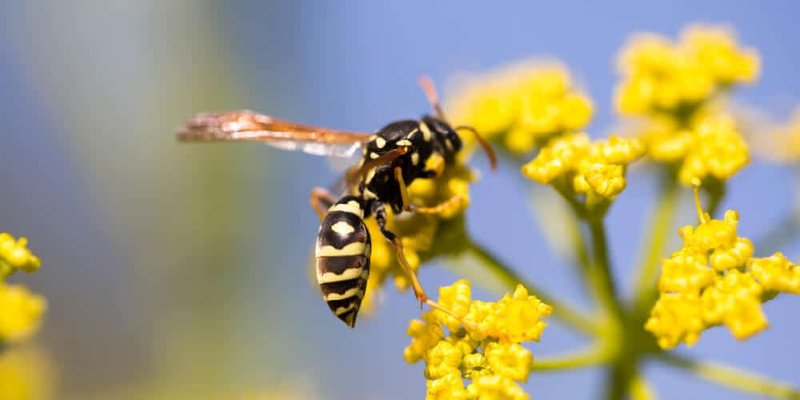
Let’s take a closer look at how these tiny creatures impact our world. Understanding their role can help us appreciate them beyond their sting. Just like how a remote control helps operate a TV, wasps help regulate various ecosystems—they might not be the stars, but they’re definitely essential for a good show!
Wasps as Pollinators
When you think about pollinators, bees often take center stage. But did you know that wasps can be effective pollinators too? While they don’t have the same fuzzy bodies that catch pollen as bees do, they still visit flowers to feed on nectar. This process inadvertently helps with pollination.
Here’s the thing: not all wasps are strict predators. Many species enjoy sweet treats and are drawn to colorful blooms. When they land on flowers, pollen sticks to their bodies, and as they move on to the next flower, they carry that pollen with them. This helps plants reproduce, which is essential for maintaining healthy ecosystems and producing the fruits and vegetables we love.
Some plants even rely heavily on specific types of wasps for pollination. For example, the fig tree has a unique relationship with certain wasps. These tiny insects lay their eggs inside figs, and in the process, they help pollinate them. Without this partnership, both the wasps and the fig trees would struggle to survive.
Pest Control Specialists
Wasps aren’t just about helping plants; they also play a crucial role in controlling pest populations. Many wasps are carnivorous and feed on other insects. Think of them as the pest control experts of the insect world. They hunt down aphids, caterpillars, and various other pests that can wreak havoc on crops and gardens.
This natural form of pest control can reduce the need for chemical pesticides, which can be harmful to the environment. When you think about it, having wasps around might be a good thing for farmers and gardeners alike. By keeping pest populations in check, wasps help maintain a healthy balance in the ecosystem.
Let me explain: when a wasp catches prey, it doesn’t just eat it—sometimes, it takes it back to its nest to feed its larvae. This means that fewer pests survive to reproduce. It’s a win-win situation for the plants and for us.
Decomposers and Nutrient Cycling
Wasps also contribute to decomposing organic matter. As they hunt and feed, they often scavenge on dead insects and animals. This action helps break down organic material and recycles nutrients back into the soil. You could think of them as nature’s recyclers!
Honestly, when dead animals or insects decompose, they release nutrients that plants need to grow. Wasps, by feeding on decaying matter, speed up this process, which is vital for soil health. Healthy soil leads to healthy plants, which in turn supports a variety of wildlife.
In this way, wasps are part of a larger web of life, connecting different elements of the ecosystem. Their actions may seem small, but they have a big impact on the health of their environment.
Wasps and Biodiversity
Biodiversity refers to the variety of life in a particular ecosystem. Wasps contribute to this diversity, not only as pollinators and predators but also by providing food for other animals. Birds, for example, rely on wasps as a food source. When wasps are present in an ecosystem, they help support a variety of other species.
You might be wondering how this all connects. By supporting other animals that depend on wasps, these insects help maintain a balanced ecosystem. More biodiversity leads to healthier ecosystems, and healthier ecosystems are better at withstanding environmental stresses, such as climate change.
In a nutshell, the presence of wasps can help create a more resilient and diverse environment. This diversity is crucial for the overall health and stability of ecosystems around the world.
The Importance of Wasps to Humans
You might not realize how important wasps are to human life. Their roles as pollinators and pest controllers directly impact agriculture and food production. By pollinating crops and keeping pest populations down, they help ensure that we have enough food to eat.
Think about how many fruits, vegetables, and nuts we enjoy. Many of these rely on the work of wasps and other pollinators. Their contributions can even affect the economy. A healthy farm with fewer pests and good yields can mean lower food prices and more availability in stores.
Here’s an interesting fact: without sufficient pollination, some of your favorite foods could become scarce. If wasn’t for wasps, along with bees and other pollinators, we might have to say goodbye to certain crops, leading to a less diverse diet.
So next time you see a wasp buzzing by, remember that it’s doing important work. They contribute to pollination, pest control, nutrient cycling, biodiversity, and even our food supply. While they might not be as charming as butterflies or as fuzzy as bees, wasps are crucial players in maintaining the health of our ecosystems.
Recognizing their role can help us shift our perspective. Instead of viewing them as mere nuisances, we can appreciate them for the valuable work they do. So let’s raise a toast to these little creatures—the overlooked champions of the natural world!
